#i mostly figured this out based on a need to quickly draw myself (poorly) for a joke
Note
im trying to draw your little guy because they're so cool but i have done 4 arts total and i have no clue how the hair works here , , (not that its bad im just terrible at perception and brain visual)
OKAY HERES AN OVERLY COMPLICATED STEP BY STEP GUIDE TO HOW I DRAW MY HAIR
basically everything is designed to be as easy and quick to draw as possible and it can all be broken down into 3 shapes. every one of them is meant to be drawn in one stroke for simplicity but if you need to take it one line at a time thats okay!
first things first is the big, defining shape. i usually draw it on the viewers right, since thats the way im most comfortable drawing curves, but it can be switched (see: my pfp where i did it the other way). the starting point/root should be at about the middle of the head, if you care much about spacing. i dont but ill try to pay attention to that here. from that you curve up and out, make it as exaggerated as you feel like. this line is supposed to go off the head for silhouette/cartoony reasons. also its fun to draw big exaggerated shapes!! after that, you pull it in for two spikes. if you cant draw the whole shape in one line, try to get these at the very least.


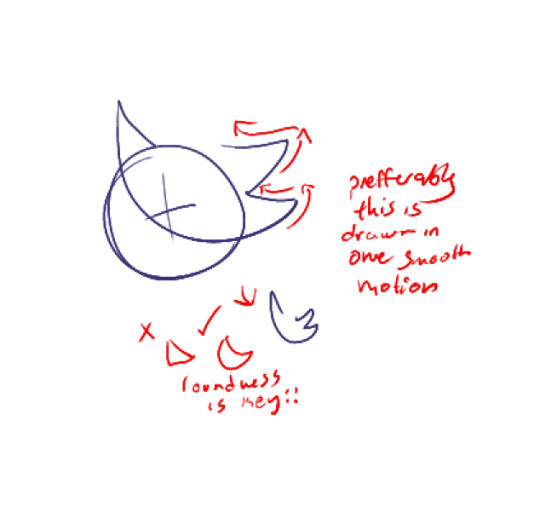
next shape is simple too. youre gonna start roughly where the first shape meets the head on the downward curve. then from there, its straight down, ending in another (much smaller but sharper) curve. two more spikes, and then right back up.
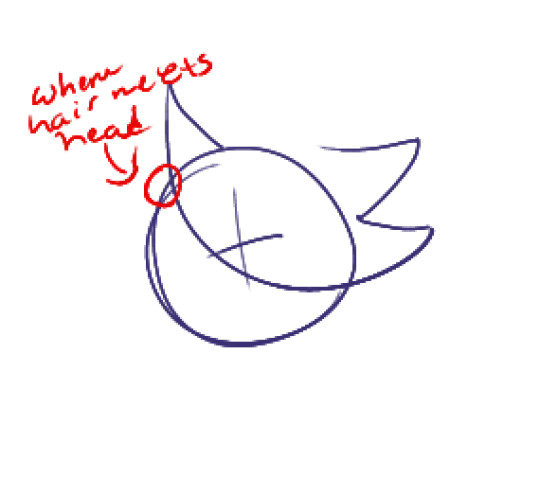


repeat on the other side, starting the other one pretty much wherever you see fit, so long as its pretty close to the other side of the head.
THAT LEAVES YOU WITH THIS BUT WERE NOT DONE YET BECAUSE THERES STILL A PONYTAIL!! luckily its more of the same


you start somewhere behind the start of the curve of the bangs? roughly the midpoint but it doesnt matter too much. here you get to draw a little oval for the start of the ponytail,,,, so little,,,,,,,. then its up a little bit and then down, then going right out again for two more spikes. the culmination of everything youve learned over the last. hold on lemme check my watch. okay its been like 6ish minutes for me but like 30 seconds ideally this shouldnt be too hard to draw.


and then its down to the dead eyed expression and hoodie that hasnt been washed in 1-2 weeks at an given moment, headphones are a give or take. and theres me!! being tired, mostly. oh so tired. and a bit sad. BUT THIS ISNT A CRY FOR HELP ITS AN ART TUTORIAL!!!!!!!!


these features basically stay the same for drawing me from any angle. mostly because im too lazy to think about how it should work in a 3d space. this is cartoon logic not real life logic. hair looks weird from a certain angle? jUST DONT DRAW IT FROM THAT ANGLE!!!! SWITCH THE BANGS AROUND IF YOU MUST!!!!!! THERE ARE NO FUCKING RULES
also hair down ash looks like this. and also what id look like in an ideal reality

okay thats it.
#i mostly figured this out based on a need to quickly draw myself (poorly) for a joke#in actuality if i have my hair up (which i do most of the time) its because of sensory annoyances w feeling my hair and/or hair getting-#-in the way. so i almost never actually have bangs#but theyre fun to draw!!!!!!!#doodles
6 notes
·
View notes
Text
One by one, like a painful slow drip from a finite source, we lose people to time, people who contributed positively to the world in ways political, artistic, scientific. One by one. Considering the sum total is simply too great, we need stagger. For those who share my year of birth by a margin of three years give or take on either side, we’ve been lucky. Lucky in the sense that the stagger has been long and wide. Over the last decade we’ve lost some important people, particularly important to our early life, the exit of our single digits and the early part of our teens. Early on I was crushed by the death of Sidney Lumet, in 2011, a giant of the film community. I wrote about his passing back then, at the point of worst emotional pain, as bad as one can feel without being a family member or close friend. Since then we’ve lost Cimino. We’ve lost Nichols. We’ve lost Varda. We’ve lost Akerman. We’ve lost Hooper and Romero. As we brine in our Gen X jar, we unfortunately transition from sniper fire to machine gun spray. Legato becomes staccato. People of my age group watch in horror as heroes depart. It’s no different of any other age group, perhaps only more enhanced by the increased prevalence of mass media over the course of the last century and into ours. Distance and folklore becomes nearness and screens. In either case we involve ourselves in the lives of others, in ways good and bad. At worst we connect through this urge to pillory those who are guilty of our very same sins. At best, we mourn the passing of a public figure we’ve come to acknowledge, without their knowledge, as a friend. Hopefully out of benevolent interest, that last part.
So I say with the melancholy of a film fanatic that came of age in the 80’s and the heft of a life, if averages count, mostly lived at this point, that the recent passing of one Alan Parker left me despondent. Perhaps not for the fate of the world, but definitely for the fate of film as a malleable form that might struggle with the twin purposes of art and commerce and succeed somehow. Film fanatics, or as I prefer to refer to myself and others, Cinegeeks, often find themselves drawn to figures within the film world considered 2nd or 3rd tier interviews, whose body of work might contain two or three masterpieces amongst a body of mediocrity, or who might have a mostly or even highly successful box office record but never get critical acclaim. Fanatics like to champion the underdog. It’s our nature. To a degree Alan Parker found himself in this category. Partially because his CV didn’t fit neatly into the Auteur Theory folder. Partially because he didn’t play the normal Hollywood game. It’s sometimes overlooked that the boldest outsiders during that New Hollywood era knew how to play the studio/PR angle and did so like sawing a harp from hell. I’m looking at YOU, Coppola and Scorsese.
Parker had artistic ambitions, some would even say pretentious ambitions, and yet I defy anyone to observe his body of work and not see a blue-collar hardscrabble mentality etching away at the base of all his films. He failed sometimes, but in all endeavors he struggled not just to ensure proper light diffusion, but to connect the audience to the scene that was unfolding and the characters within all of that art direction and brilliant cinematography. In his debut feature, the cult classic BUGSY MALONE, he invited audiences to indulge in the lark of basically watching an updated Little Rascals film as whipped-cream St. Valentine’s massacre. With an infectious soundtrack by Paul Williams. And it worked and still works. In MIDNIGHT EXPRESS, he sought nothing less than to put you through the Turkish prison system at its most barbaric. And damn, did he succeed. In FAME, he sought to enroll you in La Guardia High, the School for the Performing Arts, partially ushered in by one Mr. Lumet, and he brought you into the NYC streets to join the dance. In SHOOT THE MOON, he dragged you through the broken glass and nails that is a brutal divorce. Most critics still feel it’s the film that’ll never be topped on that topic. And yeah. It’s punishing to this day.
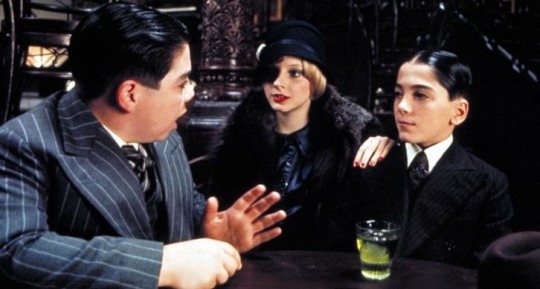
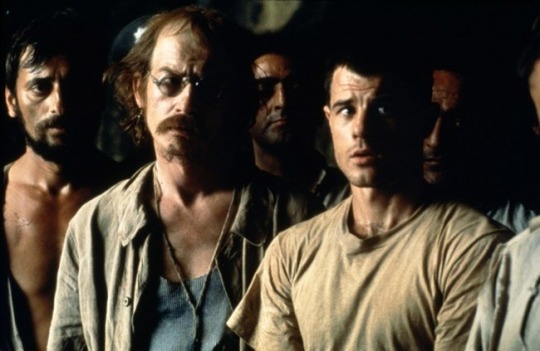
That’s just his first four films. He followed MOON in the same year with his cinematic distillation of PINK FLOYD’S THE WALL, as ambitious, reckless, insane, obtuse and inspiring as any art film dared to be. He waged one of the bravest, constant battles between the band, their label, his studio and the inevitable lash or backlash from the critics and the crowds as any director dared in that decade, which had now, even by 1992, belonged to Reagan and Thatcher’s crowd. It worked, it was a success on its own terms. It stood with QUADROPHENIA as one of the few successful adaps of a “RockOpera” to screen. And it would serve as an insanely influential piece of cinema/album mashup. I can’t think of another film that’s even attempted to match it to this day.

Parker’s true gift was that of exploration, and this was evinced by his sojourn from cinematic genre to cinematic genre. Like great directors before him, he felt the need to examine and exult in them all. He turned after 1982’s twin trials to what many referred to as William Wharton’s “un-filmable” novel. Parker found a way to film it, and in the process crafted a minor masterpiece, and the first film in his American Gothic trilogy. BIRDY is about so many things; the horror of war, the futility of grand romantic dreams, the last days of glorious, unweighted childhood. It succeeds in all those ambitions, but what it is squarely about is the healing power of friendship, of that bond between brothers that even the trauma of battle cannot best. He accomplished this in two different time periods and two different venues; the 60’s early and late, as disparate as a decade could get from itself; then the wide, economically depressed funland expanse of post-WW2 Brooklyn, against the claustrophobic, chiaroscuro lit cell of the VA, where the only shadow to hide within lies beneath the mottled cot. All of Parker’s CV can be described as character studies of one form or another. Here he began a three film sojourn into America’s pockets, its secret soul and even its original sins. He’d leave the punishing abandonment of what once was the City of Brooklyn as it stood circa 1962, for a far more insidious and painful abandonment, one of a whole swath of the country and of its stolen populace.
ANGEL HEART was ostensibly a mashup of horror and noir, a neat trick that any successful director would’ve been drawn to, especially in the MTV 80’s, a music video era (greatly inspired by directors like Parker, I might add) that found itself drawing on the tropes of past cinema genres in a highly stylized way. The synopsis implies a simple morality tale, a private eye hired by a seemingly nefarious talent agent to track down the client who’s eluded him. Perhaps by supernatural means. Parker expanded on the location by quickly resetting the action from Brooklyn to New Orleans, after a quick trip through Harlem. White culture has to answer to and for black culture in America, and Parker employed this almost caricature smoke-and-topcoat shamus to do this investigation. There is great butchery in ANGEL HEART, which I’ve always believed reps the butchery of slavery and the Jim Crow era. There are bold implications and terrible consequences for what we now term “cultural appropriation”, from Johnny Favorite’s Depression-era crooner stealing from black artists to the Krusemark’s adoption of the patchwork voodoo religion. Above all, there is guilt. There is a clear through line, as clear as Capt. Willard’s river to Kurtz, toward White America’s brutality, ongoing. Harry is our surrogate, should we choose. He goes on his own journey of discovery that becomes, unwittingly and surely unwillingly, one of SELF-discovery. His final manic, desperate denial is the same as any who enjoy white privilege to this day while at the same time being wholly unaware of it: I know who I am. If ANGEL HEART is the one he’s going to be remembered for, I believe it’s this subtext, unplanned or otherwise, that will allow it the test of time well over the brilliant cinematography and perhaps Mickey Rourke’s finest performance. Parker would next attempt to expand on this subtext and present it as text, with very, VERY mixed reactions.
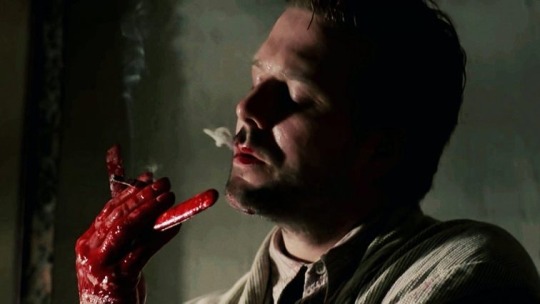
MISSISSIPPI BURNING was a project begun with noble intent, I believe. In an era where white men still got to tell the black narrative in America. While I forgive a lot of the film’s dramatic license, I fully agree with its detractors as well. 1988 was a tipping point for tone-deafness in the film industry. Had Parker made BURNING a decade or so prior, it might enjoy a better rep in the context of its time. The end of the 80’s demanded better. I’m a fan of this film, as a film, not as a history. In the same way I’m a fan of well-crafted cinematic narratives that have dated very poorly. The tragedy of MISSISSIPPI BURNING is not just that he made so well-crafted a film at a point in the timeline when something more inclusive, honest, and better representative of history was possible, it’s that he chose fiction for fiction’s sake. Nevertheless, it was the second and final Oscar nomination for direction he’d receive.
Parker remained in this wheelhouse of American guilt for 20th century wrong-doing. COME SEE THE PARADISE was an earnest attempt to depict, to REMIND America really, of the awful Japanese internment camps of the WW2 years, the venerable FDR’s greatest sin. At the height of his filmmaking powers he was unerring in his balance between stylistic pursuit and substance. Alas, with this effort and his previous, glow softened suffer, and the heart of the tale proved elusive as a result.
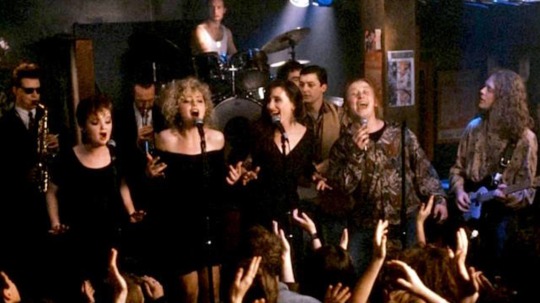
Maybe he had a moment of clarity then, after these ambitious but perhaps stultifying efforts, and decided to return to a genre that had stood him in good stead. Parker turned to the homespun Celtic kick of Roddy Doyle and decided to create a real-life soul/funk/r&b band from scratch for THE COMMITMENTS, which most will agree is his last great film, though his later fare has its champions, and fair play to them. For a director so well known for his meticulous prep and focus he fared incredibly well in filming wild abandon. Maybe it was a mode he needed to consciously shift into gear for, but once there he cooked quite a stew. The film delighted both critics and audiences, and also helped re-start a soul music resurgence, helped in no little way by the film’s pre-fab ensemble, who’d take to the road for a series of live shows with various members of the celluloid iteration in tow. Some might argue that he retreated to a stance that shied from his previous inquiries regarding the separation of cultures white and other, and the theft perpetrated by one on the other, and in doing crafted so populist an entertainment as to render the argument moot. That’s a fair assessment. Some others might argue that a truthful, passionate depiction of people inspired by others different from their living experience, plaintively plying their art, is honest work as well, no matter their skin color. The debate won’t go away. And it shouldn’t. In terms of moviemaking, though, Parker had fired on all cylinders. Perhaps for the last time.
The remaining decade-plus of his work was, in most estimations, workmanlike, with the odd Parker flourish here and there recognizable to his fans. THE ROAD TO WELLVILLE was an eccentric choice as follow-up, and also as navigation through the early days of a new and unsure decade (He’d already travelled the biz director-driven, to producer-driven, and was now in the who-the-hell’s-driving 90’s). It features several fine performances, from recent and deserved Oscar winner Anthony Hopkins to the still-finding-their-way Matthew Broderick and John Cusack, and its huckster-health theme does still resonate, or at least it SHOULD, as well today as then as late 19th century. If it ultimately found no target to spear, it remains a well crafted and intentioned work. EVITA was no sleepwalk-to the-Oscar gig, even though the resulting film is at best assessed as a dreamily-hued mess. Parker took on the challenge of a legendary broadway smash, one that Hollywood had been desperate to film for well over a decade. A lesser director would’ve turned the camera on and yelled “Sing!”. But Parker was one of the few who’d found success in the post-studio era with one of its warhorse genres, the musical, which had diminished, and decidedly felled such giants as Coppola and Bogdanovich at their peak or near-peak. It’s a noble effort, if it comes up short. It’s not quite empty Oscar-bait, but it’s well shy of a film with a purpose. He either directed or was gifted a great Antonio Banderas perf, and he did his damnedest with Madonna, which is sorta the theme of her career don’t send hate mail. He got a hard-won, decent turn out of her, perhaps not the magnetic dying star that the role demanded, but an actor giving her all. That’s still worth something, even if they’re miscast. For further evidence I direct you toward Matt Damon in THE TALENTED MR. RIPLEY.
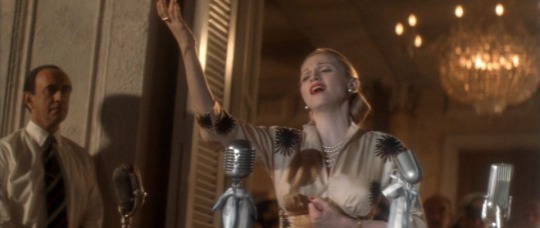
And here’s the part that I always hate to talk about. Parker was a director who, in my estimation, never sought validation, but always inspiration. It’s the source of his greatest works, and they remain some of the greatest of the post-studio years. He took his best swipe at an unlikely best-seller, Frank McCourt’s wildly successful but impossibly depressing ANGELA’S ASHES. Like EVITA, it had “prestige” built into it. Like EVITA, it was a package deal. Like EVITA, the studio expected some love from the Academy at the end of the day. I feel like Parker was thwarted from the start, tasked with this take of utter poverty and despondency while asked to chase the gold. Had the book come out sometime early in his career, had he discovered it and championed it, and then saw it through production and release, we may have been gifted something along the lines of a Ken Loach or even Buñuel at his most honest. The gilt and geld of the Hollywood studios, especially at that time competing with the newly-found prestige of the indies, precluded any chance at that, despite next-level perfs from Stephen Rea and Emily Watson. It’s a not-unworthy effort to seek out, especially if you're a Parker fan, but in some ways it may have signaled his ultimate abandonment of this art form. Maybe he felt he’d said enough. Maybe he felt he wouldn’t be allowed to say his piece on his terms anymore. Maybe he looked ahead at filmmaking in the new millennium and decided he’d not update his passport to this new continent. For reasons we never fully received, Parker was leaving.
His last film would be THE LIFE OF DAVID GALE, an anti-capital punishment screed that felt out of joint, and not due to the lack of effort from its stars, Kate Winslet and Christopher Plummer. But it’s an aimless effort, deprived of any real bite on a subject molten to a wide swath of the citizenry. It was met with mixed box office and mixed reviews. It left with nary a trace. And then, whether we realized it or not, so did Alan Parker.
It seemed to be a welcome retirement. At least in my following of my filmmaker heroes. I don’t believe I saw one item, one gossip piece, about a new Alan Parker project, about a studio extending him an offer on a prestige or even indie film. He popped up as interview subject and fairly frequently, and seemed to enjoy his status as thus. He’d crafted a remarkable body of work, and by all witness enjoyed remarking on it. He occasionally served as mentor, as when Christopher Nolan reached out to him. He’d definitely serve as defense attorney, especially when the subject of Mickey Rourke came up. He absolutely and most magnificently served as beacon to a whole generation of film lovers and future filmmakers, kids who were desperate in the corporate/production team/CAA 80’s to cling to films of their generation they could call their own. At a time when art and the so-called “auteur” was a dirty word in Hollywood he was able to put the work he’d crafted into your head and into your heart. I’m not sure if we’re gonna see another Alan Parker, and he’d be most upset by that notion, but if you’re reading this, and you find this possibility unacceptable, go grab a camera and be another Alan Parker. We’re waiting.
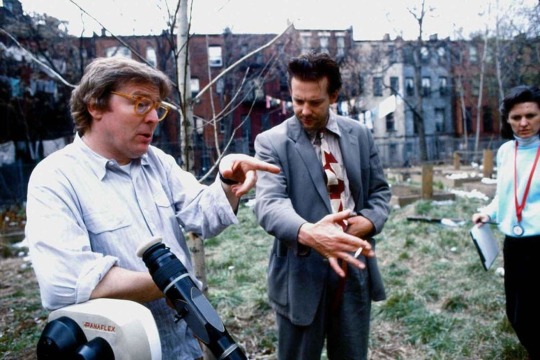
1 note
·
View note
Text
Season 3 first feedback
Whelp, so THAT happened.
Lots of stuff went on in this season! And there’s quite a damn lot to talk about! So here’s some of my initial feedback, below a cut to be safe.
I’m laughing quite a bit because I half called it with A Thousand Burning Eyes, there really was an inter-dimensional eldritch horror that pulled its way through into the world and had to be fought. It looks like it might even be controlling him to some degree, or at least influencing his actions. Is the weird creature the big bad of the show? Hilariously enough though, I also half-called the OTHER thing about Zarkon right, because he’s dead and I fucking called that months ago hahaha. This definitely explains how he breathes in space for sure! Although like...if he was dead and had a funeral and everything, why did nobody take his bayard away from him?
But man, the fact that the empire started in part due to a massive misunderstanding is...intriguing. This makes a lot of what the Blade of Marmora said make a lot more sense, too. Ulaz said back in S2E3 that his people were initially supportive of Zarkon’s attacks because they thought it would “bring stability,” and I can definitely see how they might have come to that conclusion if Zarkon is attacking Altea and the other planets for blowing up his own home-world. I wonder how much Zarkon remembers really, or if his mind is just completely controlled now by his thirst for quintessence. He definitely seems to remember the Black Lion—and that does really explain Black’s initial confusion in S2 as well. Her paladin died. Her paladin died violently, trying to save his wife, but then after 10K years he’s back again. I’d be shocked and confused too!
It actually makes me wonder if Zarkon would even be capable of piloting the Black Lion at this point, though. He’s sort-of undead. He’s very heavily warped by quintessence. The old him and all the things that made Zarkon who he was don’t appear to even be there anymore. If he got the Black Lion, could he even use it?
Also, side note—confirmation that Voltron can operate somewhat even without the black paladin, once formed. Alfor was able to get them out of there as long as the rest of the limbs substituted for the Black Lion’s strength. Zarkon was dead at that point and clearly not responsible for holding the Voltron link together. Interesting...
And while we’re talking the past, honestly I would not have pegged Alfor for the red paladin based on the temperament we’d seen of him so far. I’d always guessed on yellow or green since he was always indicated to be the Smart Guy on the team. But hey, finally paladin confirmation. I loved seeing the other paladins too for the first time, you can see where some of their personalities are similar but also different. Also, seeing Zarkon interact with them was interesting, because he was humanized (relatively speaking). He joked with the others, saved Alfor when he rushed in like a moron, got embarrassed when he met his soon-to-be wife and acted like an idiot, and even lacked confidence in combat for a short while (he was unclear if he should even lead at first until Alfor told him to be in charge). It’s even sadder to see him having fallen so far now with this backstory in effect. Although even back then he did have an obsession with power, I don’t think he’d have taken it quite to this degree on his own, when not under the influence of this whatever-the-fuck-it-is.
I do not trust Shiro’s return as far as I can throw it. My gut instinct says that Shiro isn’t real, or he’s some kind of clone/plant. I mean:
Operation Kuron. Sounds fancy...or sounds like how you might say ‘clone’ in Japanese
He could barely walk when he first stood up and even collapsed once. Could be that he’s weak/drugged, but we’ve already seen that Shiro can actually fight while drugged, albeit poorly
There was another Shiro on a table when he was escaping—one that looked like our own Shiro that we’re used to, with the undercut. Could be a hallucination like the Galra that disappeared on him right away, but I don’t think so, the image didn’t disappear on him.
On that note, hair that long? Look, I have hair that’s considered to grow very very fast, but getting it that long from Shiro’s length would take at least a year. We know it was only about 7 days between escape and rescue because he says so in his log. On that first day he saw Voltron escaping in time that lines up with “The Hunted/Ep 3″, which means the paladins had only JUST determined the new Lion shuffle. It can’t have been that long since they lost him, they wouldn’t wait an entire year before making that choice. Especially since it looks like Lotor rejoined the empire fairly quickly and started testing them immediately.
“Subject Y0XT39 has normal response to optic stimuli“
The Galra were not terribly shook up when “Shiro” escaped and said it was Stage 3 of Operation Kuron
When “Shiro” comes back he complains about a real nasty headache he can’t quite get rid of. His head also hurts him during most of his escape
He can’t pilot the Black Lion...because the Black Lion knows it’s not really Shiro
His command of the team later, when Lotor was trying to escape, was...weird. It was like he was deliberately trying to stall the whole escape and decision
My theory? This is a clone that’s been growing for a while on the side. He’s had Shiro’s memories implanted, and he thinks he’s Shiro, but he’s a sleeper agent. He’s there to either misdirect, spy on, or ultimately turn on the others at the right moment. That’s why the Lion rejects him—he’s not even Shiro, and he’s not even really a whole person yet. But I’d also hazard a guess that this will eventually turn out to be “Ryou” once everyone figures out what’s going on, they get the real Shiro back, and they manage to clear clone-Shiro of any Galra influence.
The Lion Swap was...well. We all knew it was coming. I’m still not really happy with it, but I don’t think it was as terribly handled as I was initially dreading. I like that at least the Lions were the ones that decided on the shuffle all between them; Blue basically telling Lance it was time to move on, Red yelling for Lance to get his ass in there, everyone trying Black and only Keith succeeding. So at least they had some choice in the matter. And I did like that they did show all the paladins clearly had to work to getting used to the new arrangement, between Allura failing to fly properly and whamming into everyone, Lance not being used to the Red Lion’s speed, and Keith complaining about the controls not working like Red’s did in Black. Even Hunk and Pidge, without any shuffles, still had to try and deal with a team synergy that wasn’t normal. I am a little miffed at how quickly Allura picked up on the sonic cannon in Blue, though—I mean she struggled more than Lance did with the Blue Lion, and it still took Lance a full season and a lot of Voltron formations before he unlocked it. And I really wish we had seen some of the fallout from the Lion’s perspective as well, especially on the part of Red. I mean, Red spent all of last season chasing down Keith at every opportunity, and while I wasn’t fond of how often that plot fix was used, it was an establishing characteristic for the Lion. Or—no one was even remotely suspicious that Shiro couldn’t just pick up with the Black Lion again? Nobody sat down for a second and was like ‘okay, maybe this means something?’ Not even from a suspicious perspective (a la the above clone theory) but like—hey, Shiro, what happened, did something break your leaderly confidence or something, do you need help with us working this through? I dunno. The Lions might have arranged the swaps out of necessity but it felt a little ‘eh, okay, whatever’ on the part of everyone, pilot and paladin alike, once the swaps were actually made. (Although I did find that conversation between Keith and Lance really sweet, when Lance was afraid he’d have to step down, and Keith told him not to worry).
Keith as leader took exactly the direction I myself had figured on. He tries to do things his own way and he does have the potential, but I was definitely expecting him to still act too lone-wolf and driven on the mission when he took over to the point of getting the others in serious trouble, and I was not disappointed. “The Hunted” delivered exactly on this. Honestly, only way it would have been more like the fic I had been planning out way back a couple months ago was if somebody had gotten seriously hurt, just for the extra guilt factor, and that’s mostly me as a whump fic writer talking.
Lotor as villain was actually really intriguing. He’s definitely a different kind of villain than his father, that’s for sure. Zarkon is all about brute force and wrecking anything that gets in his way. Lotor is much more of a chess-master. His first intro was brilliant, and I can see how his form of attack would be far more devastating than Zarkon’s brute-force control tactics. People pushed to the breaking point will either break or fight back. Lotor’s talk of having people “join as allies” is a much more subtle form of control; his slaves won’t realize they are slaves and that’s far more dangerous. I’d have to re-watch again too, but I don’t think the Voltron paladins ever saw him once, just heard his voice and fought his commander ladies...who were also awesome, diverse in powers and skills, and really intriguing. They seem very loyal to Lotor, enough to attack other Galra soldiers...I wonder what he’s done to earn that loyalty? They know he’s manipulative because he’s said as much to their faces: “The masses are easily manipulated,” followed by transferring the guy he just fake-offered a hand of support to to a place where he could ‘rot with the ice worms.’ And he did get very angry with them once, when they failed to secure the piece of teludav. So far he’s mostly had victories, even if the battle comes out to a draw or a loss; everything he’s set out to do so far (test Voltron’s new pilots, test Voltron itself, get the weird ore, get the ore-ship). His one loss was losing the teludav and he was not happy about that. I wonder if he knows his dad is a zombie? Is that where the rift comes from? They said he was exiled for a time...I wonder what happened there? And now that Zarkon’s back, is there gonna be trouble between them?
What the fuck is with Shiro’s terrible new outfit. Just another indication that he’s not the real Shiro, srsly. Ew.
Lance’s first attempt to get the Blue Lion to open up to him again was to try and flirt with it and I think that’s awesome. Less awesome that “Are you from outer space because your body is out of this world” is his best pickup line. Lance, get better material, srsly.
On that note, Allura trying to emulate him by flirting. Terribly. HAH.
SLAV. Okay look, I was bitterly disappointed OUR SLAV wasn’t in this entire thing, but at least we got SOME Slav in the form of an Alternate Reality Slav, which is just fitting, really. And he’s a freedom fighter! That works with AU-Sven! They fucking put Sven in, I’m dying. That entire episode was just a whole bunch of “what the actual fuck is going on right now” but man I was laughing so hard. Guns of Gamora. WTF. Haha.
BUT SRSLY BRING BACK SLAV D: Rescue the comet-ship and then have him examine it and tell us all about other worlds kthnx.
Blade of Marmora: they were in one episode, and they kinda briefly touched on the whole Galra-racism thing and then they disappear. I’m not really sure what to think of this since they were so integral in S2. This has me a bit puzzled and all the more suspicious, but honestly, my wariness of the BOM is an essay for another day.
Also, the BOM Naruto-run, and they lost about 50 coolness points because of that, sorry gais.
The space-cat thing. First of all, awesome that they brought it in, and I hope the space mice get a show down for it. (BTW...WHERE SPACE MICE? They were only in it like ONCE). But like...how frickin’ old is that thing? It used to be Haggar’s before she was Haggar but now one of Lotor’s commanders has it. Did he get it from Haggar and hand it off to his blind subordinate????
Shiro’s arm can cauterize. CALLED IT. He should’ve gotten really sick after that though, cauterization leads to infection which is why it’s kind of a last-ditch first aid option.
Bayards! The question is finally answered. Everyone has a specific bayard-form that fits them, regardless of which bayard they’re actually using. Keith had a black sword, Lance had a red gun, and Allura got that crazy whip thing. So cool! Still wanna know what Shiro’s will be though.
There’s probably loads more but I’m too jazzed to think of them. Enjoy guys! Hope you had fun watching!
40 notes
·
View notes